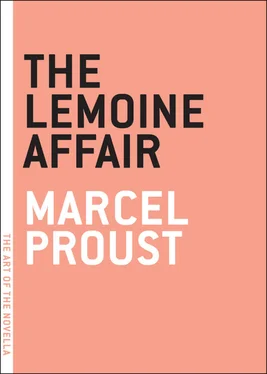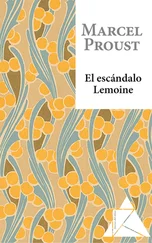… A society where beautiful women, where noblemen of high birth, adorn their bodies with real diamonds is condemned to irremediable coarseness. The worldly man, the man for whom the dry rationality, the entirely superficial brilliance provided by classical education, are enough, might take pleasure in it. Truly pure souls, minds passionately attached to the good and the true, would experience an unbearable sensation of suffocation in such a society. Such customs could exist in the past. We will not see them again. During Lemoine’s time, according to all appearances, they had long ago become obsolete. The dull collection of implausible stories which bears the title The Human Comedy by Balzac is perhaps the work neither of one single man nor of one single era. Yet his still unshaped style, his ideas all marked by an old-fashioned absolutism, allow us to place its publication at least two centuries before Voltaire. However, Mme de Beauséant, who, in these insipidly dry fictions, personifies the perfectly distinguished woman, already shows scorn for the wives of nouveau riche businessmen appearing in public adorned with precious stones. It is probable that in Lemoine’s day a woman anxious to please was content to add some leaves to her hair where some dewdrop still trembled, as sparkling as the rarest diamond. In the cento of disparate poems entitled Songs of the Streets and the Woods , which is commonly attributed to Victor Hugo, although it is probably a little later than that, the words “diamonds” and “pearls” are used indiscriminately to portray the glittering of drops of water gushing from a murmuring spring, sometimes from a simple shower. In a kind of erotic little romance that recalls the Song of Songs , the bride says in so many words to the Husband that she wants no other diamonds than the drops of dew. Probably it is a question here of a generally accepted custom, not of an individual preference. This last hypothesis is, moreover, excluded in advance by the perfect banality of these little pieces that have been ascribed to the name of Hugo by virtue no doubt of the same desire for publicity that must have made Qoheleth ( Ecclesiastes ) decide to adorn his spiritual maxims with the respected name of Solomon, who was much in vogue at that time.
Moreover, if they find out tomorrow how to make a diamond, I will undoubtedly be one of the least likely people to attach much importance to it. That has a lot to do with my education. I had scarcely reached the age of forty, when at the public meetings of the Society of Jewish Studies, I met some of the people liable to be strongly impressed by news of such a discovery. At Tréguier, with my first masters, then later on at Issy, at Saint-Sulpice, this news would have been met with the most extreme indifference, perhaps with an ill-concealed scorn. Whether or not Lemoine found a way to make diamonds, we cannot imagine how little that would have affected my sister Henriette, my uncle Pierre, M. Le Hir, or M. Carbon. At bottom, I have always remained on this point, as well as on many others, an old-fashioned disciple of Saint Tudual and Saint Colomban. This has often led me to utter, in all things having to do with luxury, unforgivably naïve remarks. At my age, I would not even be capable of going to buy a ring at a jeweler’s. Ah! It’s not in our Trégorrois that young ladies receive from their fiancés, like the Shulamite, strings of pearls, expensive necklaces set with silver, “ vermiculata argento .” For me, the only precious stones that would still be capable of making me leave the Collège de France, despite my rheumatism, and take to the sea, but only if one of my old Breton saints consented to take me out on his apostolic bark, are the ones the fishermen in Saint-Michel-en-Grève sometimes glimpse at the bottom of the sea during fair weather, where the city of Ys used to stand, set in the stained-glass windows of its hundred drowned cathedrals.
… No doubt cities like Paris, London, Paris-Plage, Bucharest, will look less and less like the city that appeared to the presumed author of the Fourth Gospel, the city built of emerald, jacinth, beryl, chrysoprase, and other precious stones, with twelve doors each formed from a single fine pearl. But living in such a city would soon make us yawn with boredom, and who knows if the incessant contemplation of a setting like the one in which John’s Apocalypse unfolds might risk making the universe perish suddenly from a brainstorm? More and more the fundabo te in saphiris et ponam jaspidem propugnacula tua et omnes terminus tuos in lapides desiderabiles will appear to us as a simple figure of speech, like a promise kept for the last time at St. Mark’s in Venice. It is clear that if he supposed he ought not deviate from the principles of urban architecture according to Revelation, and if he meant to apply to the letter the Fundamentum primum calcedonius …, duodecimum amethystus , then my eminent friend M. Bouvard would risk postponing indefinitely the continuation of Boulevard Haussmann.
Patience, then! Humanity, patience. Rekindle tomorrow the furnace that has already gone out a thousand times whence the diamond might one day emerge! With a good humor that the Eternal can envy in you, perfect the crucible where you will make carbon rise to temperatures unknown to Lemoine and Bertholet. Tirelessly repeat the sto ad ostium et pulso , without knowing if a voice will ever reply: Veni, veni, coronaberis . Your story has now entered a path from which the stupid fantasies of the vain and the aberrant will never contrive to make you stray. The day Lemoine, by an exquisite play on words, called simple drops of water valuable only in their freshness and limpidity “precious stones,” the cause of idealism was won forever. He did not make a diamond: he made the price of an ardent imagination, of perfect simplicity of heart, incontestable — things important in other ways for the future of the planet. They will lose their value only on the day that a deeper knowledge of cerebral localizations and the progress of brain surgery allow us easily to set in motion the infinitely delicate mechanisms that awaken modesty and an innate sense of beauty. On that day, the free thinker, the man who has a high idea of virtue, would see the value on which he placed all his hopes undergo an irresistible movement of depreciation. Surely the believer who hopes to exchange a virtue he bought cheaply with indulgences for a share of eternal felicities, is desperately attached to an untenable proposition. But it is clear the virtue of the free thinker would scarcely be worth anything at all the day it becomes merely the compulsory result of the success of an intracranial operation.
Men of a given era see among the various personalities who by turns seek out public attention all sorts of differences that they think are enormous, yet that posterity will not notice. We are all rough drafts where the genius of one epoch is prelude to a masterpiece that it will probably never execute. For us, between two personalities like the honorable M. Denys Cochin and Lemoine, the dissimilarities leap to the eye. They might perhaps escape the Seven Sleepers, if they awoke a second time from the sleep they fell into in the reign of the Emperor Decius which was thought to last a scant three hundred seventy-two years. The Messianic point of view can no longer be our own. Less and less does the privation of some gift or other of the mind seem to us to deserve the wonderful curses it inspired in the unknown author of the Book of Job. “Compensation”—this word, which dominates Emerson’s philosophy, could well be the last word of all sound judgment, the judgment of the true agnostic. The Comtesse de Noailles, if she is the author of the poems attributed to her, left an extraordinary work, a hundred times superior to Qoheleth, or to Béranger’s songs. But what a false position that must have given her in society! She seems, moreover, to have understood this perfectly and to have led in the country, perhaps not without some ennui, 3an entirely simple, retired life, in the little orchard that usually serves as her interlocutor. The excellent singer Polin might perhaps be a little lacking in metaphysics; but he possesses a quality that is a thousand times more precious and which neither the son of Sirach nor Jeremiah ever knew: a delicious joviality, exempt from the slightest trace of affectation, etc.
Читать дальше



![Marcel Proust - In Search of Lost Time [volumes 1 to 7]](/books/579170/marcel-proust-in-search-of-lost-time-volumes-1-to-thumb.webp)








